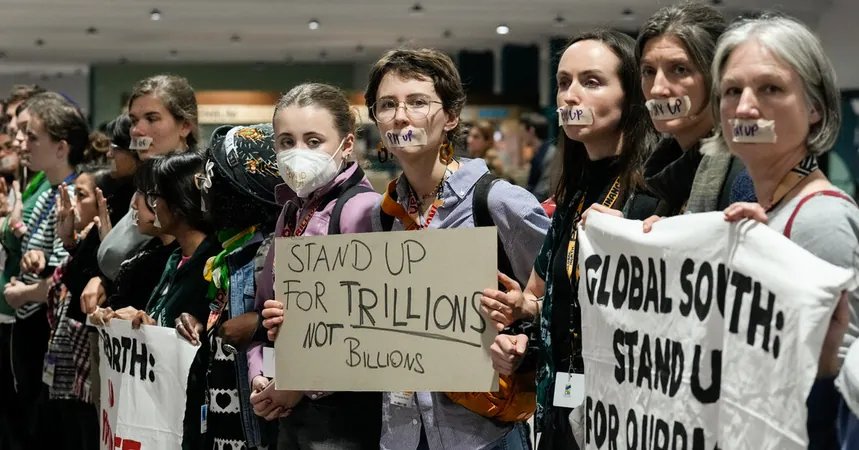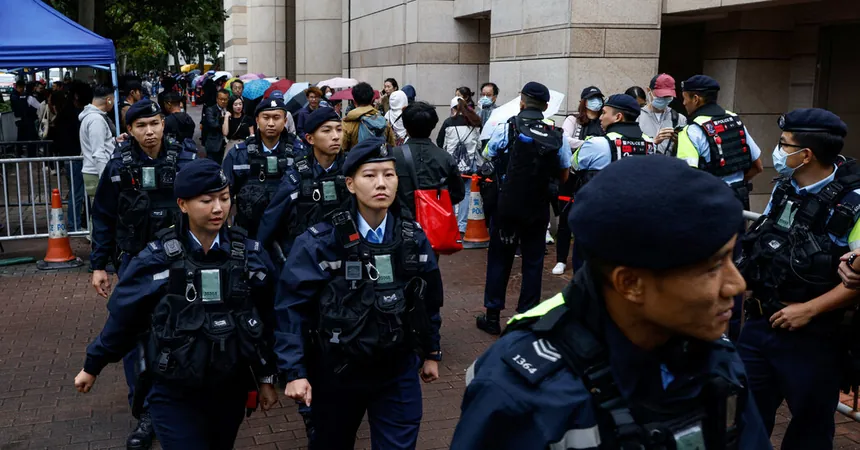
COP29 Climate Talks: Major Financial Development for Climate Action Amid Tensions
2024-11-24
Author: Ming
Major Financial Development for Climate Action
In a dramatic turn of events, negotiators at the United Nations COP29 climate summit in Baku, Azerbaijan reached a contentious agreement early Sunday morning that promises to significantly increase financial support for developing nations. The deal aims to triple the annual flow of climate financing to $300 billion by 2035 from the previous target of $100 billion. This announcement came after prolonged negotiations characterized by intense disagreements among participants, particularly between developed and developing countries.
Concerns Over Financial Shortfalls
However, independent experts argue that this pledge falls dramatically short of what is actually needed. The estimated financial requirements for energy transitions and climate impact mitigation in developing countries could soar as high as $1.3 trillion annually—far exceeding the commitments made during the talks. Experts emphasize that without this level of investment, the goal of limiting global warming to under 1.5 degrees Celsius may remain out of reach, with dire implications for the planet.
Criticism from Developing Nations
The agreement calls for private businesses and international financial institutions, including the World Bank, to help bridge the significant funding gap. This stipulation is seen by some critics as a convenient way for wealthy countries to deflect their responsibility.
Immediately following the announcement, Indian delegate Chandni Raina voiced her frustration, labeling the agreement as an "optical illusion" that fails to meet the urgent needs of developing nations. She stated, "This is a paltry sum. We seek a much higher ambition from developed countries." The sentiment was echoed by representatives from multiple other developing nations—each expressing their discontent over what they view as inadequate support.
Juan Carlos Monterrey, Panama’s special envoy for climate, further amplified the criticism by denouncing the summit as "chaotic" and a "complete failure in terms of delivering the ambition required."
Political Complications
The negotiations were further complicated by the recent election of Donald J. Trump, who could potentially retract U.S. commitments and withdraw the country from the Paris Agreement, adding turbulence to already fraught discussions between climate advocates and policymakers.
Expectations were high going into the summit; however, many warned of the adverse effects of U.S. political changes on global climate finance. The Republican-led Congress was anticipated to dwindle funds directed towards international climate initiatives, particularly those aiding Ukraine, thereby limiting resources available for climate action.
A Silver Lining?
Despite these challenges, some negotiators believe that Trump's election has inadvertently accelerated the urgency for a swift transition to sustainable energy solutions across various economies still reliant on fossil fuels. John Podesta, climate envoy for President Biden, asserted that negotiations were still active and that the U.S. would continue to make concerted efforts towards reducing emissions despite impending political shifts.
Outcome and Future Commitments
The agreement, while non-binding, surfaced after a grueling two weeks of negotiations that often seemed to lose focus. Complications also arose from debates surrounding which countries should contribute to climate financing, with developed nations urging countries like China and Saudi Arabia to participate. However, these calls were met with significant resistance.
Frustrations escalated as developing nations highlighted the gap between promises and actual financial disbursements, claiming that wealthy nations had not lived up to their earlier commitments. The negotiations concluded at sunrise on Sunday, marking another year in which the global community has faced record-breaking temperatures and disappointing emissions reports.
As nations grapple with the urgency of climate action, upcoming deadlines for submitting updated emissions reduction commitments loom large, especially for the world's two largest emitters: China and the United States. For China, which accounts for 30% of global emissions, this is a critical moment of accountability. Meanwhile, the Biden administration's stance will send strong signals about the future of U.S. climate policy.
Continued Challenges Ahead
Last year's COP conference in Dubai marked a pivotal moment as nations recognized the link between fossil fuels and climate change for the first time. However, resistance from countries with strong fossil fuel dependencies, particularly Saudi Arabia, indicates that challenges remain. Reports suggest that Saudi negotiators continue to push back against commitments designed to transition away from fossil fuels.
The outcome of COP29 serves as a stark reminder of the critical crossroads facing the planet, as the path to meaningful change continues to encounter resistance, leaving many to wonder: Can we make the necessary commitments before it’s too late?




 Brasil (PT)
Brasil (PT)
 Canada (EN)
Canada (EN)
 Chile (ES)
Chile (ES)
 España (ES)
España (ES)
 France (FR)
France (FR)
 Hong Kong (EN)
Hong Kong (EN)
 Italia (IT)
Italia (IT)
 日本 (JA)
日本 (JA)
 Magyarország (HU)
Magyarország (HU)
 Norge (NO)
Norge (NO)
 Polska (PL)
Polska (PL)
 Schweiz (DE)
Schweiz (DE)
 Singapore (EN)
Singapore (EN)
 Sverige (SV)
Sverige (SV)
 Suomi (FI)
Suomi (FI)
 Türkiye (TR)
Türkiye (TR)